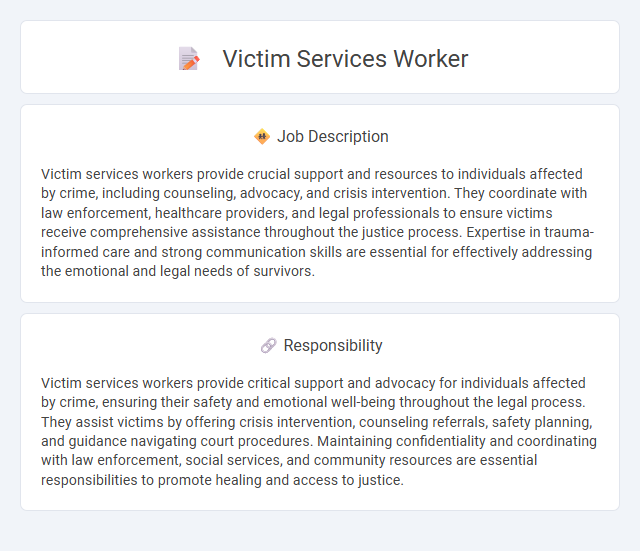
Victim services workers provide crucial support and resources to individuals affected by crime, including counseling, advocacy, and crisis intervention. They coordinate with law enforcement, healthcare providers, and legal professionals to ensure victims receive comprehensive assistance throughout the justice process. Expertise in trauma-informed care and strong communication skills are essential for effectively addressing the emotional and legal needs of survivors.
Individuals experiencing trauma, crisis, or emotional distress are likely to encounter victim services workers who provide essential support and advocacy tailored to their needs. Those with strong empathy, resilience, and effective communication skills might find a suitable and fulfilling fit in this role. Candidates prone to high stress or emotional burnout may need to carefully evaluate their capacity to manage the demands of helping vulnerable populations.
Qualification
Victim services workers typically require a bachelor's degree in social work, psychology, criminal justice, or a related field, with some positions demanding specialized training in trauma-informed care or crisis intervention. Strong communication skills, empathy, and the ability to handle sensitive situations are essential qualifications for providing effective support to victims of crime. Certification or licensure in victim advocacy or counseling enhances job prospects and demonstrates professional competence in the field.
Responsibility
Victim services workers provide critical support and advocacy for individuals affected by crime, ensuring their safety and emotional well-being throughout the legal process. They assist victims by offering crisis intervention, counseling referrals, safety planning, and guidance navigating court procedures. Maintaining confidentiality and coordinating with law enforcement, social services, and community resources are essential responsibilities to promote healing and access to justice.
Benefit
A Victim Services Worker likely experiences significant job satisfaction through helping individuals recover from trauma and connecting them with essential resources. The role probably offers opportunities for professional growth in counseling and crisis intervention skills. Furthermore, this position may provide a strong sense of purpose and community impact, which can enhance overall well-being and job fulfillment.
Challenge
Victim services workers likely face the challenge of managing high emotional stress due to constant exposure to trauma and crisis situations. They probably need strong resilience and coping strategies to handle unpredictable and intense interactions with victims. Balancing empathy with professional boundaries may also present ongoing difficulties in maintaining effective support.
Career Advancement
Victim services workers can advance their careers by gaining specialized certifications in trauma counseling, crisis intervention, or victim advocacy, which enhance their expertise and eligibility for supervisory roles. Pursuing higher education, such as a master's degree in social work or criminal justice, often leads to positions in program management or policy development within victim services organizations. Experience in diverse settings, combined with continuous professional development, positions workers for leadership roles that influence victim support strategies and community outreach initiatives.
 kuljobs.com
kuljobs.com